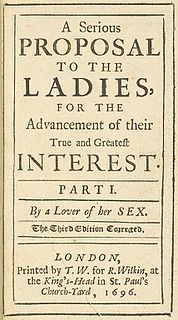A Quote by Mary Astell
For my part I think the Learned, and Unlearned Blockhead pretty equal; for 'tis all one to me, whether a Man talk Nonsense, or unintelligible Sense, I am diverted and edified alike by either; the one enjoys himself less, but suffers his Friends to do it more; the other enjoys himself and his own Humour enough, but will let no body else do it in his Company.
Related Quotes
Whether he sleeps or wakes,--whether he runs or walks,--whether he uses a microscope or a telescope, or his naked eye,--a man never discovers anything, never overtakes anything, or leaves anything behind, but himself. Whatever he says or does, he merely reports himself. If he is in love, he loves; if he is in heaven, he enjoys; if he is in hell, he suffers. It is his condition that determines his locality.
A Christian should put away all defense and make no attempt to excuse himself either in his own eyes or before the Lord. Whoever defends himself will have himself for his defense, and he will have no other. But let him come defenseless before the Lord and he will have for his defender no less than God Himself.
The solitary and thoughtful stroller finds a singular intoxication in this universal communion. The man who loves to lose himself in a crowd enjoys feverish delights that the egoist locked up in himself as in a box, and the slothful man like a mollusk in his shell, will be eternally deprived of. He adopts as his own all the occupations, all the joys and all the sorrows that chance offers.
No man, however enslaved to his appetites, or hurried by his passions, can, while he preserves his intellects unimpaired, please himself with promoting the corruption of others. He whose merit has enlarged his influence would surely wish to exert it for the benefit of mankind. Yet such will be the effect of his reputation, while he suffers himself to indulge in any favourite fault, that they who have no hope to reach his excellence will catch at his failings, and his virtues will be cited to justify the copiers of his vices.
There is no deception on the part of the woman, where a man bewilders himself: if he deludes his own wits, I can certainly acquit the women. Whatever man allows his mind to dwell upon the imprint his imagination has foolishly taken of women, is fanning the flames within himself -- and, since the woman knows nothing about it, she is not to blame. For if a man incites himself to drown, and will not restrain himself, it is not the water's fault.
Reason cannot desire for man any condition other than that in which not only every individual enjoys the most absolute, unbounded freedom to develop himself out of himself, in true individuality, but in which physical nature, as well, need receive no other shaping by human hands than that which is given to her voluntarily by each individual, according to the measure of his wants and his inclinations, restricted only by the limits of his energy and his rights.
It is God's earth out of which man is taken. From it he has his body. His body belongs to his essential being. Man's body is not his prison, his shell his exterior, but man himself. Man does not "have" a body; he does not "have" a soul; rather he "is" body and soul. Man in the beginning is really his body. He is one. He is his body, as Christ is completely his body, as the Church is the body of Christ
Freedom of Will-that is the expression for the complex state of delight of the person exercising volition, who commands and at the same time identifies himself with the executor of the order-who, as such, enjoys also the triumph over obstacles, but thinks within himself that it was really his own will that overcame them. In this way the person exercising volition adds the feelings of delight of his successful executive instruments, the useful underwills or under-souls-indeed, our body is but a social structure composed of many souls-to his feelings of delight as commander.
I'd say the player whose style most resembles mine would be Neymar. That's because I played with a sense of joy and you can see that he feels the same and really enjoys his own play. He doesn't play for himself or just to entertain the fans - he plays for his team. He uses his quality and skill for the good of the team.
If a young man gets married, and starts a family and spends the rest of his life working at a soul-destroying job, he is held up as an example of virtue and responsibility. The other type of man, living only for himself, working only for himself, doing first one thing and then another simply because he enjoys it and because he has to keep only himself, sleeping where and when he wants, and facing woman when he meets her on equal terms and not as one of a million slaves, is rejected by society. The free, unshackled man has no place in its midst.
Good work is no done by "humble" men. It is one of the first duties of a professor, for example, in any subject, to exaggerate a little both the importance of his subject and his own importance in it. A man who is always asking "Is what I do worth while?" and "Am I the right person to do it?" will always be ineffective himself and a discouragement to others. He must shut his eyes a little and think a little more of his subject and himself than they deserve. This is not too difficult: it is harder not to make his subject and himself ridiculous by shutting his eyes too tightly.





































